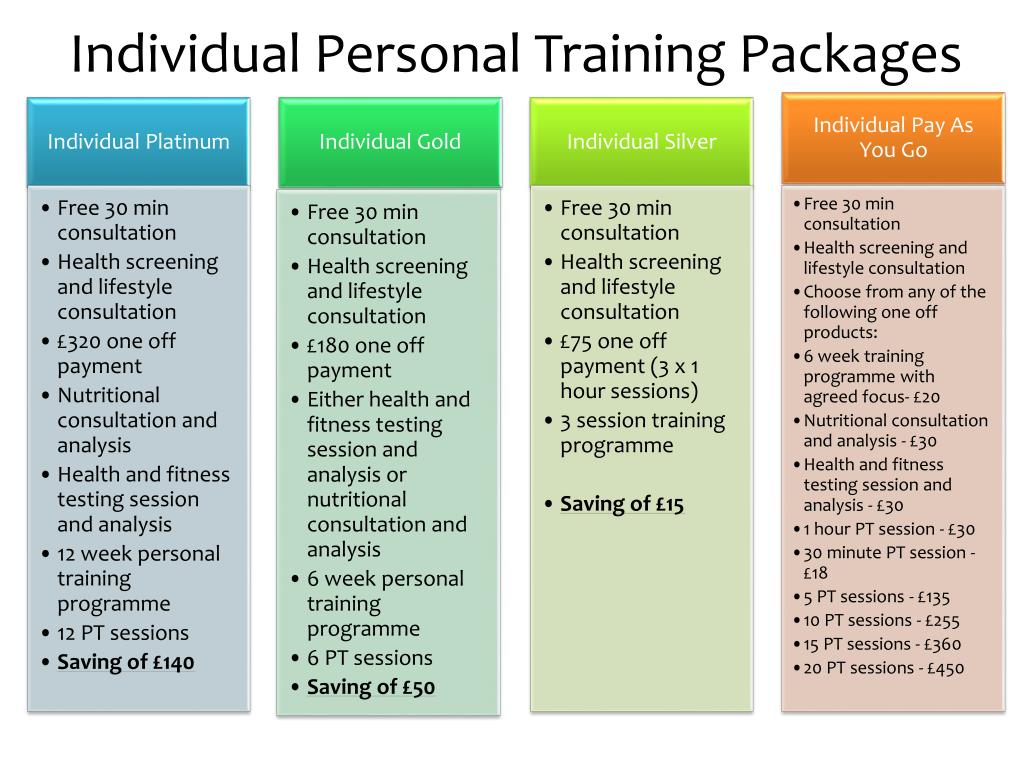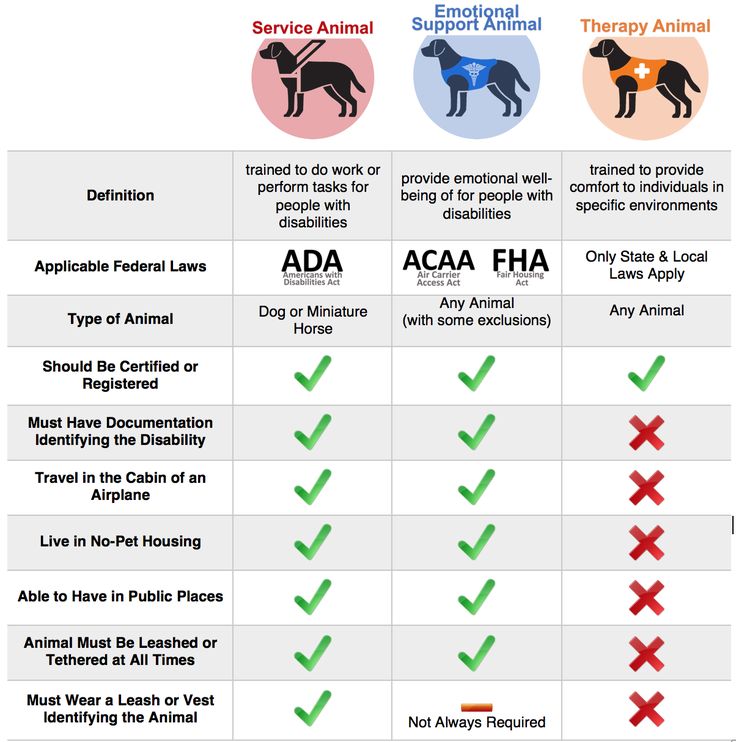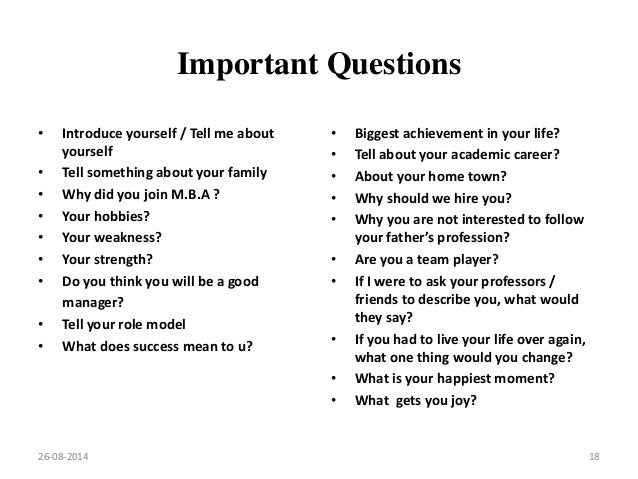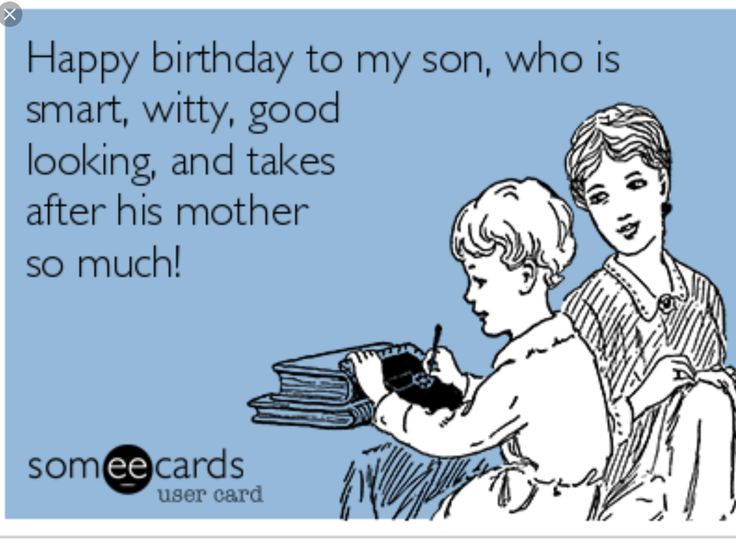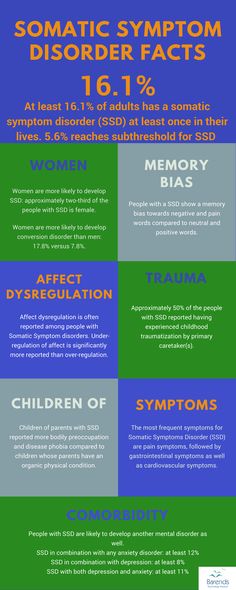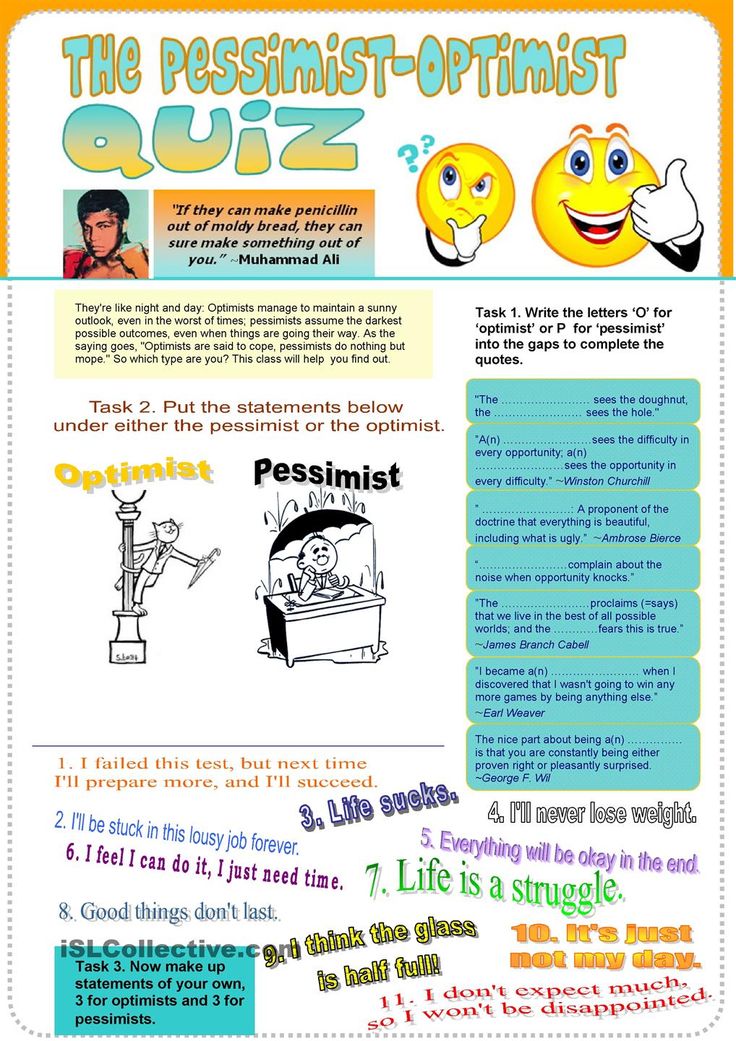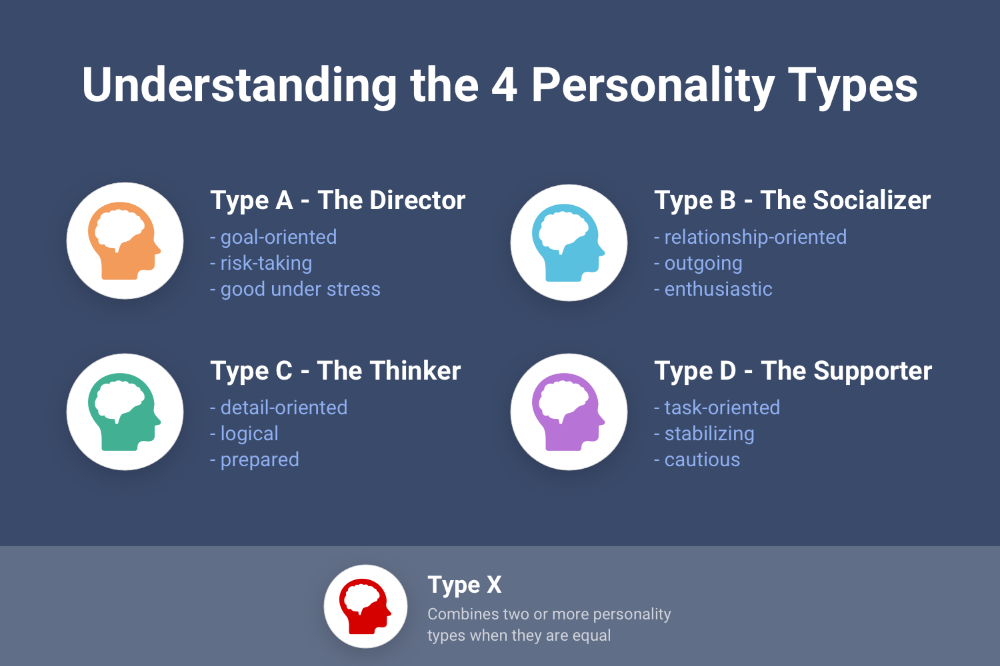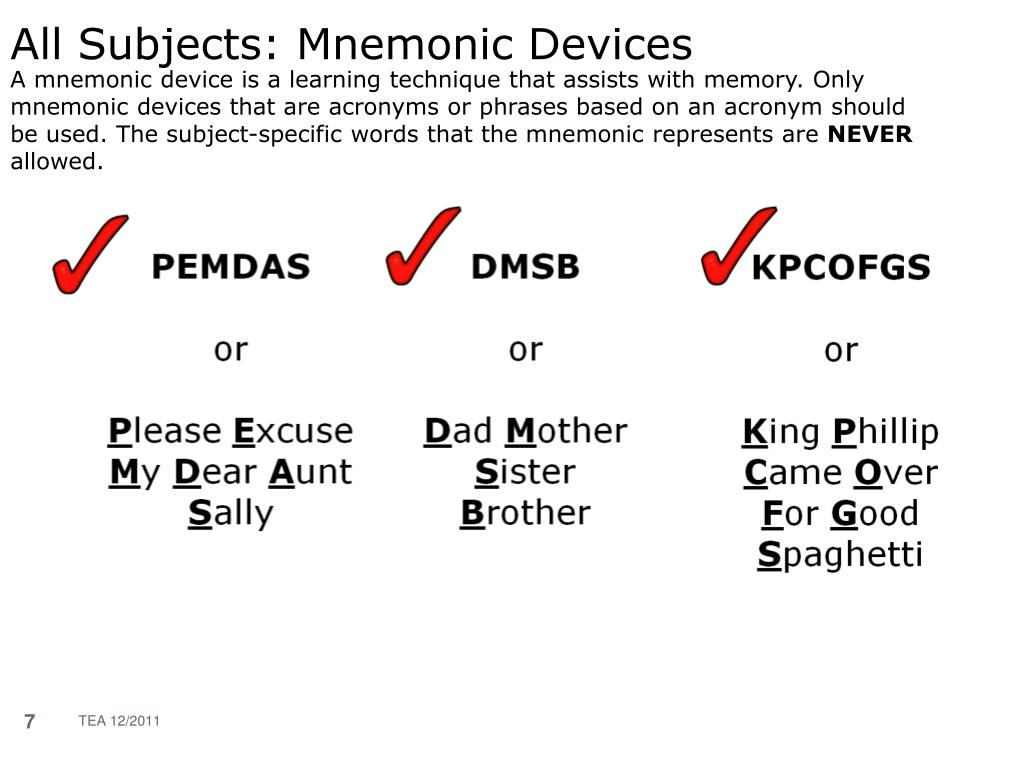Individualist personality type
Enneagram Type 4: The Individualist
Fours are defined by their sense of being special and different from other people. They are often creative, and present a unique, distinctive persona to the people around them.
Fours experience a deep conflict in that they long to connect with others, but they feel that because they are so unusual, very few people are able to truly see them as they are.
Deepest Fear: Fours fear that they are flawed and are missing out on some basic aspect of happiness that other people have access to. To cope with this fear, they amplify what is different and special about themselves, looking for the niche in which they can truly be appreciated.
Core Motivations: Fours are motivated by their desire to express their individuality and to be unique. They do this through creative endeavors and by over identifying with the aspects of their personality that they view as lacking or deficient.
Key Personality Traits of the 4
- Distinctive inner and outer presentation
- Prominent artistic outlet(s)
- Quirky and endearing
- Melancholic expression
-
Strong sense of identity
-
May feel a sense of emptiness
-
Passionate about self-expression
How Rare are Enneagram 4s?
- In a Truity study of more than 54,000 respondents, Type Fours were found to make up approximately 11% of the population; 12% of women and 10% of men.
Enneagram Type 4 In Depth
Individualists may stand out to others from their unique choice of fashion, unconventional lifestyle and interests or creative works.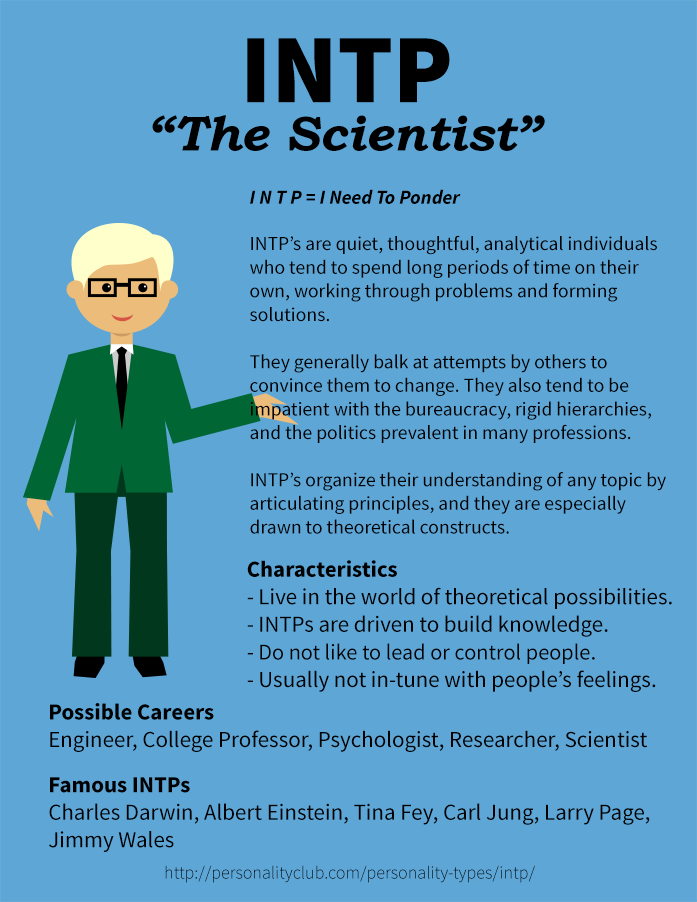 Offbeat yet endearing, Individualists have a relentless drive to discover and understand who they truly are, deep down. Creation — not consumption — is the key to their well-being.
Offbeat yet endearing, Individualists have a relentless drive to discover and understand who they truly are, deep down. Creation — not consumption — is the key to their well-being.
Fours spend a large amount of time reflecting on the past and using experiences and feelings as a springboard for creative musings and new projects.
Through a process of continuous exploration of the inner self (the conscious and unconscious sides), Individualists produce original work, untouched by the expectations of others.
Individualists struggle with an attachment to the parts of themselves that they view as deficient. Fours tend to over-identify as people who are more flawed than others. They undervalue the positive aspects of their personality and idealize the positive traits in other people.
At their best, Fours are extremely creative, compassionate and self-aware. At their worst they can be self-victimizing and self-destructive.
Like Type Twos and Type Threes, Fours are part of the “heart-based” triad of the Enneagram.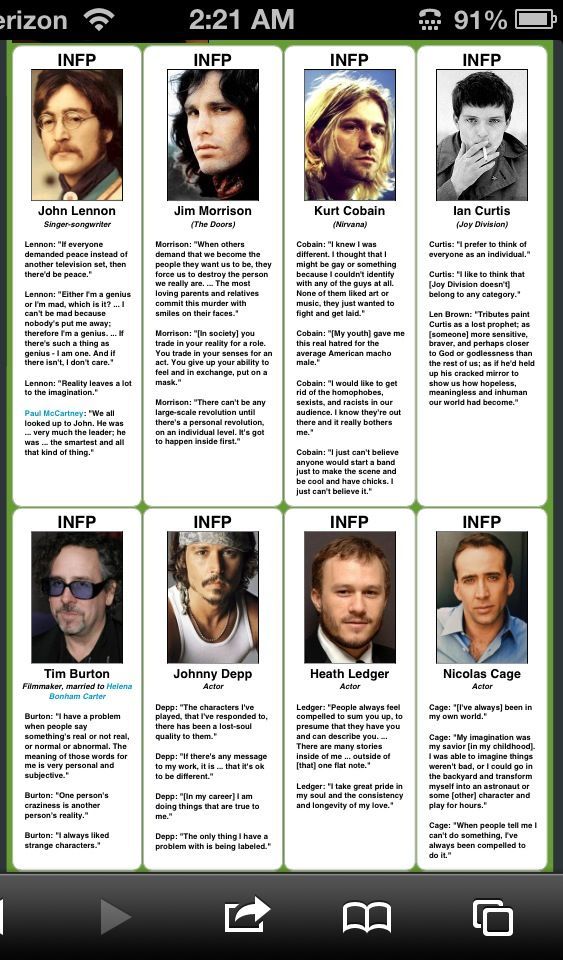 The core emotion of the types in this triad is sadness. Fours, Twos and Threes all struggle with feeling like they cannot be loved for who they are.
The core emotion of the types in this triad is sadness. Fours, Twos and Threes all struggle with feeling like they cannot be loved for who they are.
Fours, however, are the type most likely to embrace this grief, rather than repress or feel conflicted over it. Sadness can take on a form of identity for this type.
Individualist Fours have a deep and complex relationship with their emotions. Growth happens when Fours learn to get out of their heads and become open to experiencing true love and acceptance from other people.
Enneagram 4 Wings
4w3: Enneagram Type Four wing Threes are Fours who possess many of the same traits as Type Threes. 4w3s tend to be more energetic and driven than other Fours. They seek to make an impact in the world while maintaining a deep sense of self. They are more sociable and image conscious than other Fours. Careers common for this type include entertainment, broadcast journalism, photography, fitness instructor and motivational speaker.
4w5: The 4w5 type is a Four who shares many characteristics with the Type Five. This type will appear more reserved, intellectual, and introspective than other Fours. 4w5s seek to understand the world deeply, and strive to make an impact within it. They may appear withdrawn and overly focused on the self. Popular careers for 4w5 types are writing, music, graphic design and literature.
Core Values of Enneagram 4s
- Authenticity and self-expression are the pinnacle of the Individual’s existence.
- Their ultimate goal is for the world to recognize and appreciate their wholly unique identity.
- They strongly believe that their striking difference from others should always be consistent.
- Succumbing to ‘trends’ would be considered the ultimate act of self-betrayal.
How to Recognize an Enneagram 4
Individualists are offbeat, have a strong sense of self-identity and pride themselves on being unique.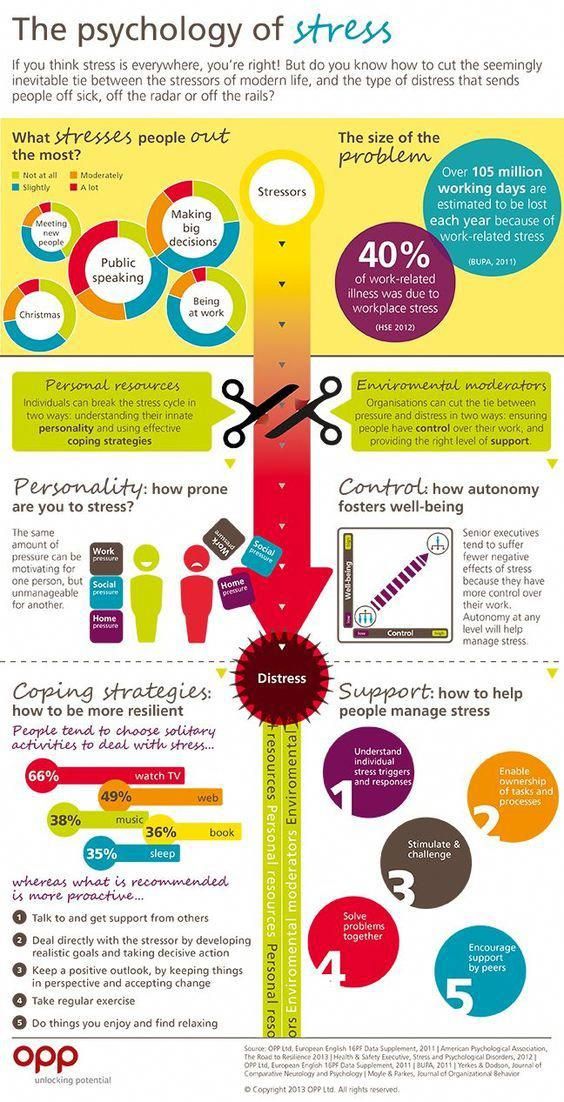 They are often found pursuing some sort of creative outlet such as music, comedy or animation.
They are often found pursuing some sort of creative outlet such as music, comedy or animation.
Their ultimate goal is to accurately present their true selves to the world in order to feel real, healthy and whole. An Individualist’s style and way of life often has notes of openness, and suggests this person is exploring their own psyche through their appearance.
Thrift stores and flea markets are particular favorite picks of Individualists. When it comes to self-expression, Individualists take their presentation very seriously. They constantly evaluate every decision and its alignment to their personal values.
Healthy vs. Unhealthy Enneagram 4s
When they are healthy, Fours create thought-provoking and groundbreaking works of art that shift perspectives toward the greater good. They’re recognized as idea synthesizers who can help others rethink what art should be. Major shifts in art styles and fashion eras are largely due to the out-of-the-box thinking from self-actualized Individualists, since they possess the ability to rework past experiences into new works of art.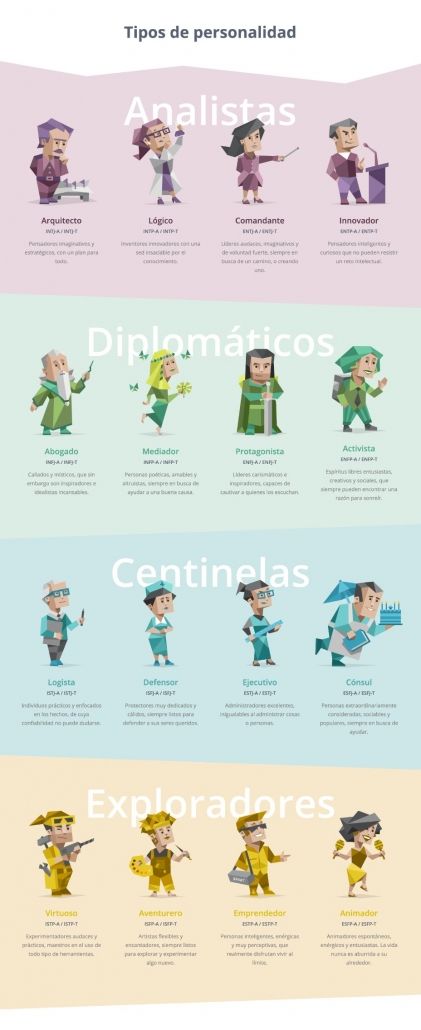 Highly attuned to their complex well of emotions, Individualists undergo a process of metamorphosis in the cocoon of self-acceptance before fully emerging as a butterfly with wings to soar.
Highly attuned to their complex well of emotions, Individualists undergo a process of metamorphosis in the cocoon of self-acceptance before fully emerging as a butterfly with wings to soar.
When they are average, Fours let out their stress through a creative outlet and may bond with a community of like-minded people to gain inspiration and support along the way. Emotionally intense and introspective, they’re seekers of authenticity, sometimes at the expense of others’ patience and feelings. Self-absorbed and artistically expressive, Individualists maintain their personal mood and inspiration board to piece together the different aspects of themselves and their identity. At average levels, they may become hypersensitive to criticism yet firm to themselves. This results in them actively seeking praise and flattery. They may be strongly offended if others try to copy or relate to their experiences.
When they are unhealthy, Fours become excessively moody, depressed and fragile.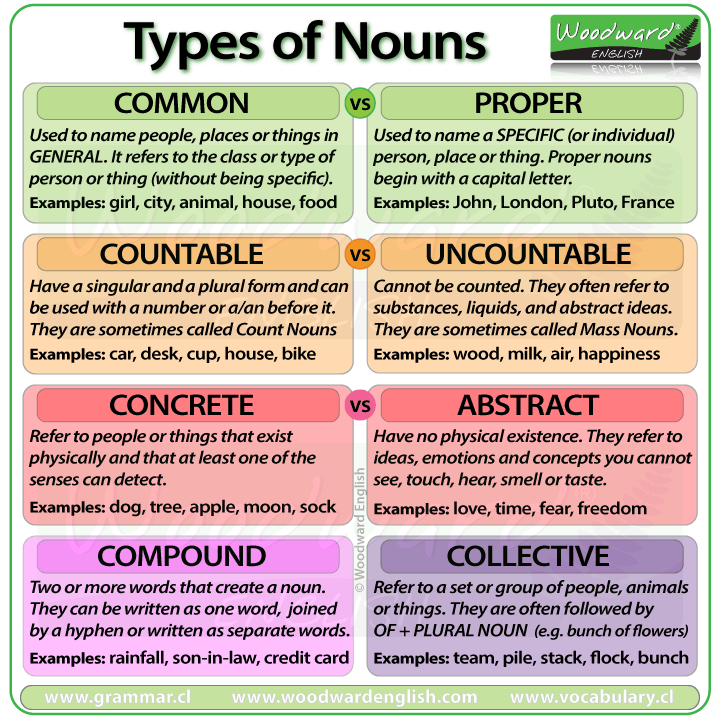 They can develop an extreme tendency to ruminate, which is intrusive to their natural creative energies. In extreme cases, they may lose their grip on reality and resort to extreme sensory coping mechanisms such as alcohol or hallucinogens. The search for the ‘missing piece’ leads Individualists down a never-ending spiral of dead ends and roundabouts. They can fall into the same ditches and make the same mistakes if they refuse to admit their self-destructive behaviors and thinking patterns. They’re prone to developing the belief that there’s something inherently ‘broken’ about them. At the peak of their stress, Individualists may delete their entire presence from the web and isolate themselves from the world.
They can develop an extreme tendency to ruminate, which is intrusive to their natural creative energies. In extreme cases, they may lose their grip on reality and resort to extreme sensory coping mechanisms such as alcohol or hallucinogens. The search for the ‘missing piece’ leads Individualists down a never-ending spiral of dead ends and roundabouts. They can fall into the same ditches and make the same mistakes if they refuse to admit their self-destructive behaviors and thinking patterns. They’re prone to developing the belief that there’s something inherently ‘broken’ about them. At the peak of their stress, Individualists may delete their entire presence from the web and isolate themselves from the world.
Growth Tips for Enneatype 4s
- Practice positive affirmations. Fours are prone to negative self-talk. By focusing your mind on positive thoughts, you can develop a kinder, more positive self-image and mindset.
- View yourself from another person’s perspective.
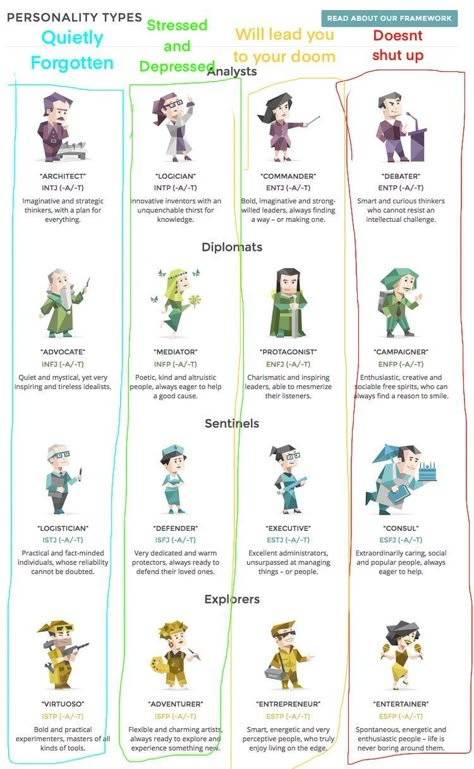 Keep in mind that your feelings, though valid, are subjective. Emotions are not all you are, but a part of who you are. Try to view yourself more objectively, specifically looking at your positive traits and accomplishments.
Keep in mind that your feelings, though valid, are subjective. Emotions are not all you are, but a part of who you are. Try to view yourself more objectively, specifically looking at your positive traits and accomplishments. - Consider the ways in which you are similar to those around you. Fours focus their attention on how they’re different from others. Instead, look for ways to connect with others. What do you have in common? Doing this will help you form deeper relationships.
- Start small. Fours may feel like they lack the confidence and discipline to get things done. If what you want to accomplish feels overwhelming, break it up into small, achievable steps.
- Learn to be open to constructive feedback — positive and negative. It’s essential for Fours to get out of their heads and learn to accept feedback from the outer world. Understand that negative feedback isn’t an attack on who you are as a person.
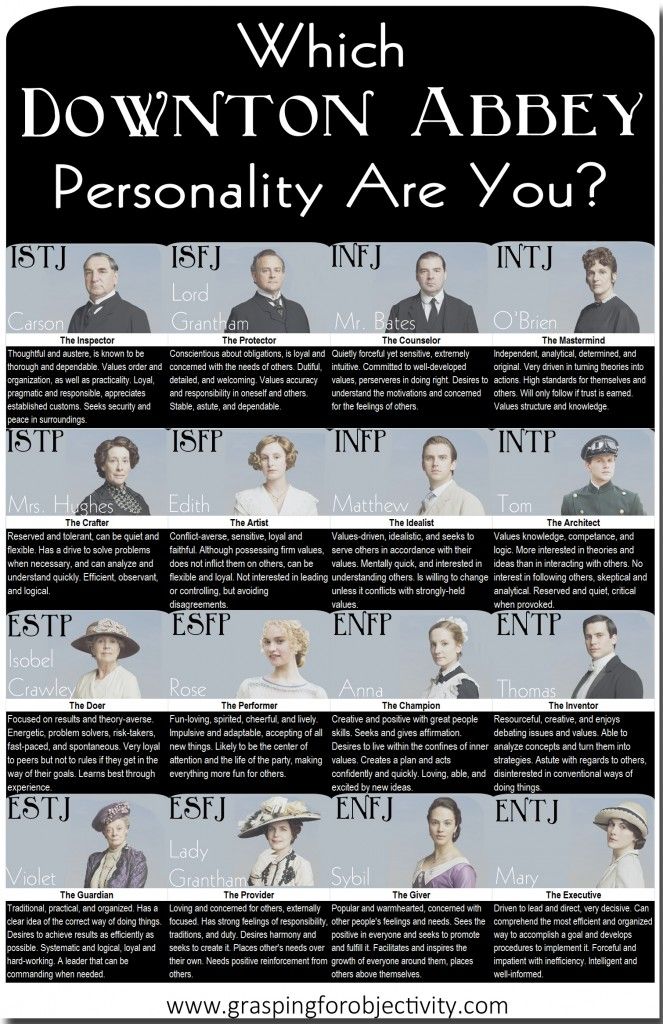 And positive feedback isn’t something to dismiss or devalue. There are important lessons to be learned from constructive feedback.
And positive feedback isn’t something to dismiss or devalue. There are important lessons to be learned from constructive feedback.
Famous Enneagram Type 4s
- Frida Kahlo
- Billie Eilish
- Rumi
- Jackie Kennedy Onassis
- Joni Mitchell
- Bob Dylan
- Prince
- Rihanna
- Stevie Nicks
- Johnny Depp
- Winona Ryder
- Sylvia Plath
- Prince Charles
- Amy Winehouse
- Kurt Cobain
- “Anne Shirley” (Anne of Green Gables)
- “Rapunzel” (Rapunzel)
- “Luna Lovegood” (Harry Potter)
- “April Ludgate” (Parks and Rec)
Type 4s in Relationships
Enneagram Relationship content was co-developed with marital therapist turned relationship coach Christa Hardin (MA).
Enneagram Type Fours in love are the true romantics of the Enneagram! The Romeos and Juliets of the Enneagram of sorts, full of passion and adoration, Fours can develop truly deep bonds and feelings together with their partner.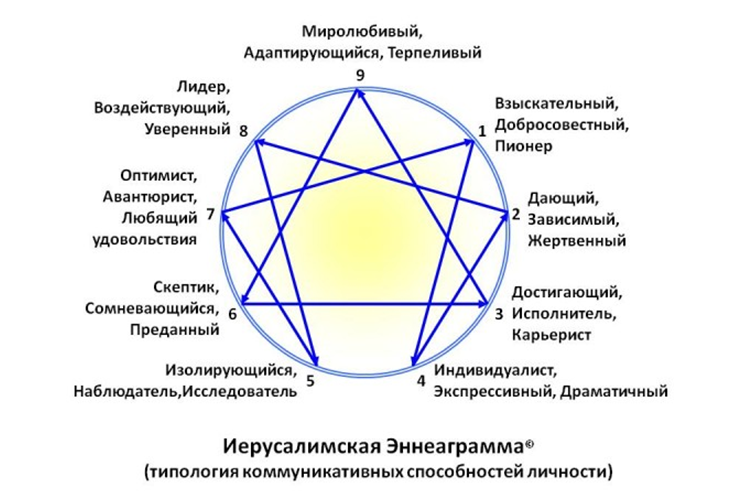 Fours know how to focus attention on their own feelings, the feelings of others and the interpersonal connection and disconnection between friends, partners and children.
Fours know how to focus attention on their own feelings, the feelings of others and the interpersonal connection and disconnection between friends, partners and children.
As a mate, since they often feel a sense of deficiency about their own worth and envy the spouse or partner, they may fantasize about a more ideal life, or have low self esteem as they come to terms with all they are not.
Fours in a relationship appreciate meaningful interactions of all kinds and are not afraid of conflicts as long as they get to the bottom of things and some withdrawing time when overwhelmed. They need this time as they have a keen aesthetic wisdom and move more slowly in the world than some. However, their close view lets them see errors others miss.
Fours in a relationship are also known for being a bit on and off - reserved and withdrawn one moment, then energetic and actively loving the next.
The envy of Fours develops from an early sense of loss which leads to the perception that there is something better outside of the Fours’ experience.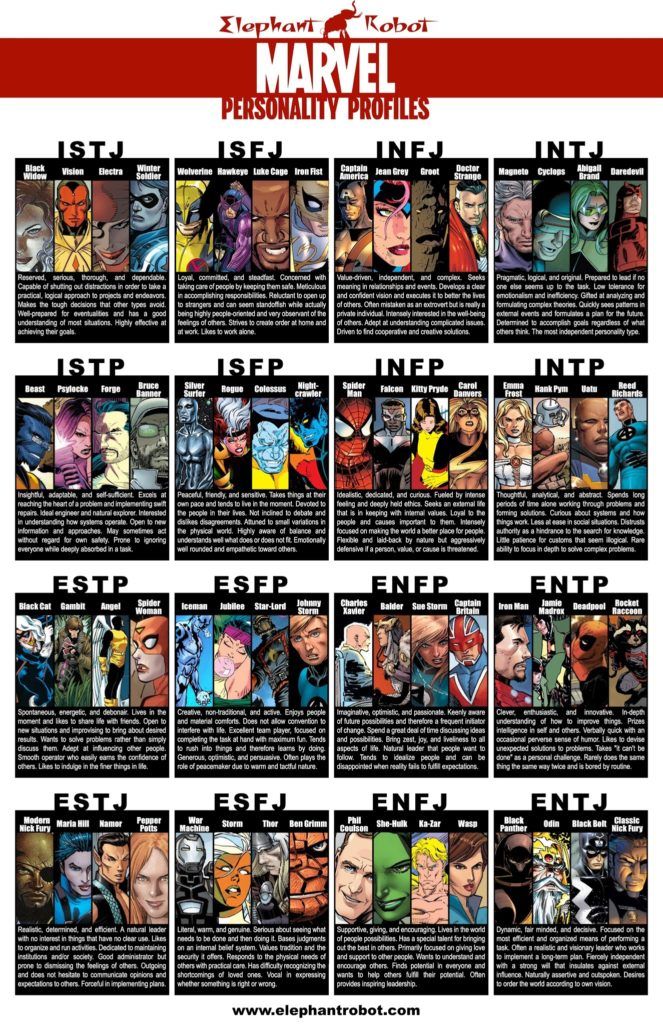 This missing component they can seek is believed to be the fault of the Four, the result of some personal deficiency.
This missing component they can seek is believed to be the fault of the Four, the result of some personal deficiency.
If you love a Four, remember that when they feel uncertain about the relationship, they will test you to see if you love them and try to evoke an emotional reaction. It’s healthy for you to be not only logical and caring, but to show some emotions also, even if less dramatic than your partner and you’re mostly being an active listener. Fours also need plenty of time to withdraw, as well as quality time with you, so that they can understand themselves better and so you can potentially understand them better.
Also remember that Fours don’t evoke emotions from you to be cruel, but because they are feeling lonely and rejected. Don’t abandon them here. Instead, encourage them to find time to both explore their own spirituality (including through religion, or seeking a higher power) and to take care of their physical or mental health. Finally, you can give them permission to have some space, while also assuring them of your love.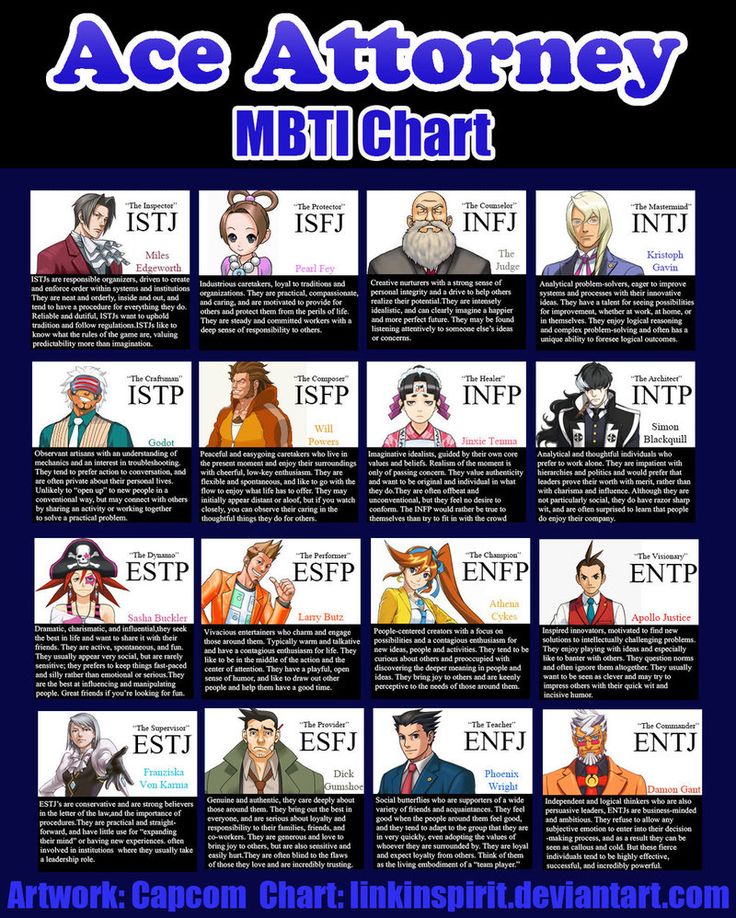 Click here to find the Enneagram and Marriage Glow Pairing Guides so you can find tips for a type Four with each of the individual types!
Click here to find the Enneagram and Marriage Glow Pairing Guides so you can find tips for a type Four with each of the individual types!
- Type Fours with Type Ones: Tend to be both organized and creative. Click here to find the Type 4 & Type 1 couple pairing guide for this match.
- Type Fours with Type Twos: Tend to be both romantic and caring. Click here to find the Type 4 & Type 2 couple pairing guide for this match.
- Type Fours with Type Threes: Tend to be both passionate and productive. Click here to find the Type 4 & Type 3 couple pairing guide for this match.
- Type Fours with Type Fours: Tend to be both empathic and creative. Click here to find the Type 4 & Type 4 couple pairing guide for this match.
- Type Fours with Type Fives: Tend to be both passionate and focused. Click here to find the Type 4 & Type 5 couple pairing guide for this match.
- Type Fours with Type Sixes: Tend to be both creative and loyal. Click here to find the Type 4 & Type 6 couple pairing guide for this match.
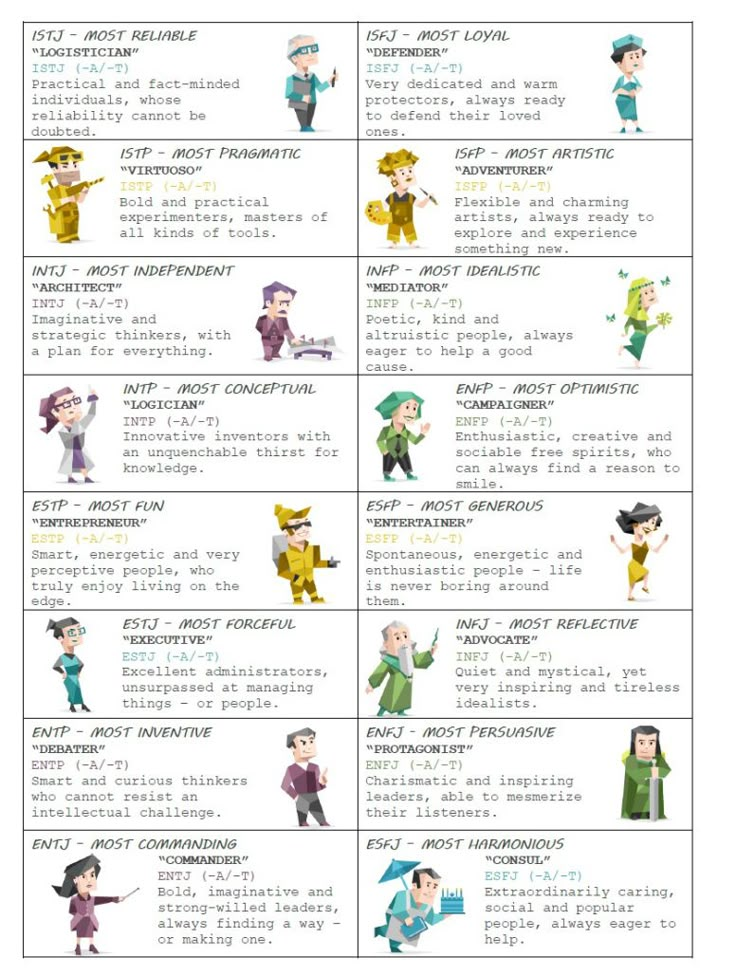
- Type Fours with Type Sevens: Tend to be both idealistic and passionate. Click here to find the Type 4 & Type 7 couple pairing guide for this match.
- Type Fours with Type Eights: Tend to be both creative and driven. Click here to find the Type 4 & Type 8 couple pairing guide for this match.
- Type Fours with Type Nines: Tend to be both thoughtful and relaxed. Click here to find the Type 4 & Type 9 couple pairing guide for this match.
- ‹ Enneagram Type 3: The Achiever
- Enneagram Type 5: The Investigator ›
Type Four — The Enneagram Institute
4THE INDIVIDUALIST
Enneagram Type Four
The Sensitive, Introspective Type:
Expressive, Dramatic, Self-Absorbed, and Temperamental
Type Four in Brief
Fours are self-aware, sensitive, and reserved. They are emotionally honest, creative, and personal, but can also be moody and self-conscious. Withholding themselves from others due to feeling vulnerable and defective, they can also feel disdainful and exempt from ordinary ways of living. They typically have problems with melancholy, self-indulgence, and self-pity. At their Best: inspired and highly creative, they are able to renew themselves and transform their experiences.
Withholding themselves from others due to feeling vulnerable and defective, they can also feel disdainful and exempt from ordinary ways of living. They typically have problems with melancholy, self-indulgence, and self-pity. At their Best: inspired and highly creative, they are able to renew themselves and transform their experiences.
- Basic Fear: That they have no identity or personal significance
- Basic Desire: To find themselves and their significance (to create an
identity) - Enneagram Four with a Three-Wing: "The Aristocrat"
- Enneagram Four with a Five-Wing: "The Bohemian"
Key Motivations: Want to express themselves and their individuality, to create and surround themselves with beauty, to maintain certain moods and feelings, to withdraw to protect their self-image, to take care of emotional needs before attending to anything else, to attract a "rescuer.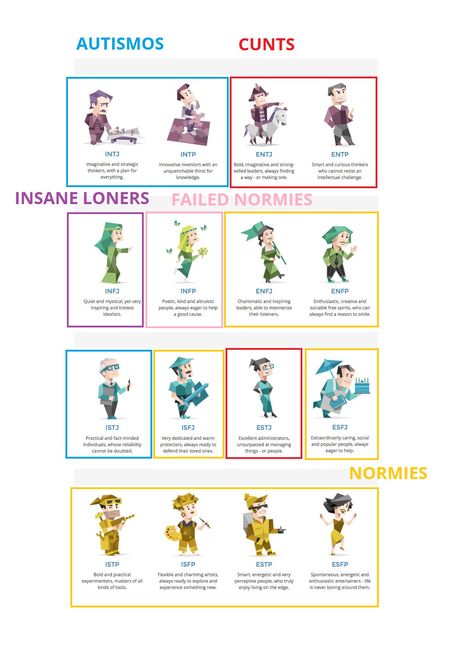 "
"
The Meaning of the Arrows (in brief)
When moving in their Direction of Disintegration (stress), aloof Fours suddenly become over-involved and clinging at Two. However, when moving in their Direction of Integration (growth), envious, emotionally turbulent Fours become more objective and principled, like healthy Ones. Learn more about the arrows.
Examples: Rumi, Frédéric Chopin, Pyotr I. Tchaikovsky, Gustav Mahler, Jackie Kennedy Onassis, Edgar Allen Poe, Yukio Mishima, Virginia Woolf, Anne Frank, Karen Blixen / Isak Dinesen, Anaîs Nin, Tennessee Williams, J.D. Salinger, Anne Rice, Frida Kahlo, Diane Arbus, Martha Graham, Rudolf Nureyev, Cindy Sherman, Hank Williams, Billie Holiday, Judy Garland, Maria Callas, Miles Davis, Keith Jarrett, Joni Mitchell, Bob Dylan, Paul Simon, Leonard Cohen, Yusuf Islam (Cat Stevens), Ferron, Cher, Stevie Nicks, Annie Lennox, Prince, Sarah McLachlan, Alanis Morrisette, Feist, Florence ( + the Machine) Welch, Amy Winehouse, Ingmar Bergman, Lars von Trier, Marlon Brando, Jeremy Irons, Angelina Jolie, Winona Ryder, Kate Winslet, Nicolas Cage, Johnny Depp, Tattoo Artist Kat Von D. , Magician Criss Angel, Streetcar Named Desire's “Blanche duBois”
, Magician Criss Angel, Streetcar Named Desire's “Blanche duBois”
Type Four Overview
We have named this type The Individualist because Fours maintain their identity by seeing themselves as fundamentally different from others. Fours feel that they are unlike other human beings, and consequently, that no one can understand them or love them adequately. They often see themselves as uniquely talented, possessing special, one-of-a-kind gifts, but also as uniquely disadvantaged or flawed. More than any other type, Fours are acutely aware of and focused on their personal differences and deficiencies.
Healthy Fours are honest with themselves: they own all of their feelings and can look at their motives, contradictions, and emotional conflicts without denying or whitewashing them. They may not necessarily like what they discover, but they do not try to rationalize their states, nor do they try to hide them from themselves or others. They are not afraid to see themselves “warts and all. ” Healthy Fours are willing to reveal highly personal and potentially shameful things about themselves because they are determined to understand the truth of their experience—so that they can discover who they are and come to terms with their emotional history. This ability also enables Fours to endure suffering with a quiet strength. Their familiarity with their own darker nature makes it easier for them to process painful experiences that might overwhelm other types.
” Healthy Fours are willing to reveal highly personal and potentially shameful things about themselves because they are determined to understand the truth of their experience—so that they can discover who they are and come to terms with their emotional history. This ability also enables Fours to endure suffering with a quiet strength. Their familiarity with their own darker nature makes it easier for them to process painful experiences that might overwhelm other types.
Nevertheless, Fours often report that they feel they are missing something in themselves, although they may have difficulty identifying exactly what that “something” is. Is it will power? Social ease? Self-confidence? Emotional tranquility?—all of which they see in others, seemingly in abundance. Given time and sufficient perspective, Fours generally recognize that they are unsure about aspects of their self-image—their personality or ego-structure itself. They feel that they lack a clear and stable identity, particularly a social persona that they feel comfortable with.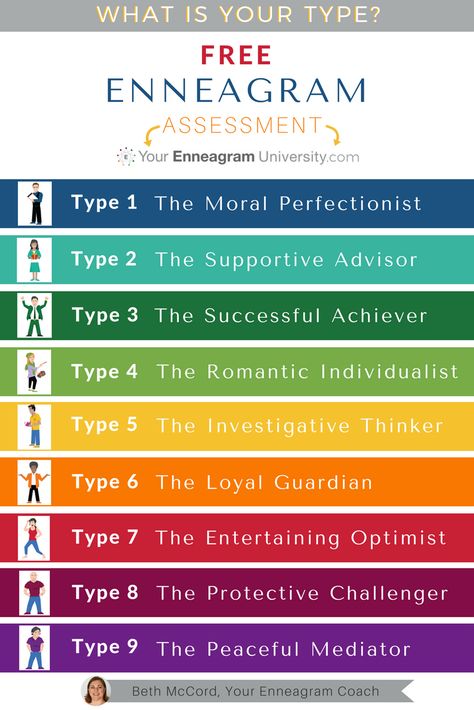
While it is true that Fours often feel different from others, they do not really want to be alone. They may feel socially awkward or self-conscious, but they deeply wish to connect with people who understand them and their feelings. The “romantics” of the Enneagram, they long for someone to come into their lives and appreciate the secret self that they have privately nurtured and hidden from the world. If, over time, such validation remains out of reach, Fours begin to build their identity around how unlike everyone else they are. The outsider therefore comforts herself by becoming an insistent individualist: everything must be done on her own, in her own way, on her own terms. Fours’ mantra becomes “I am myself. Nobody understands me. I am different and special,” while they secretly wish they could enjoy the easiness and confidence that others seem to enjoy.
Fours typically have problems with a negative self-image and chronically low self-esteem. They attempt to compensate for this by cultivating a Fantasy Self—an idealized self-image which is built up primarily in their imaginations.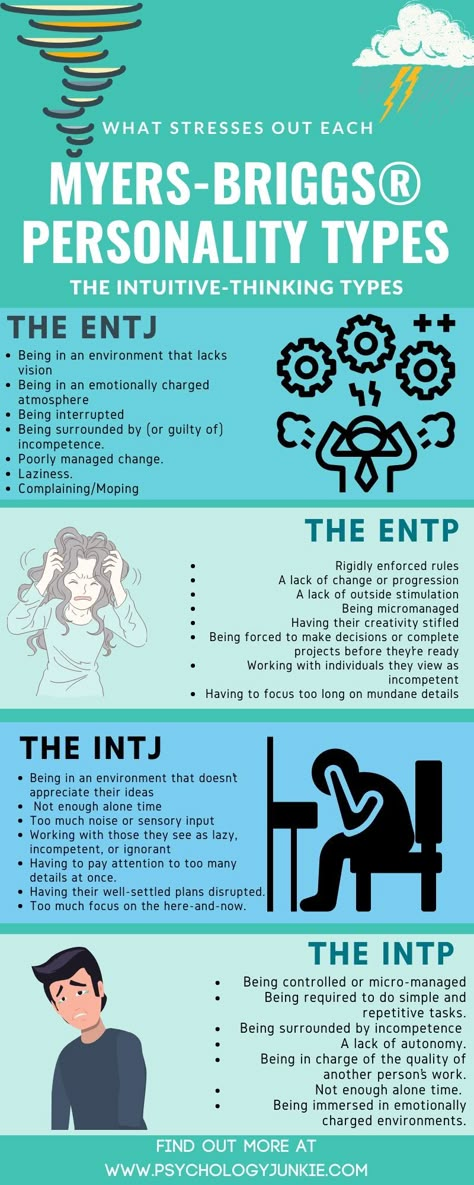 A Four we know shared with us that he spent most of his spare time listening to classical music while fantasizing about being a great concert pianist—à la Vladimir Horowitz. Unfortunately, his commitment to practicing fell far short of his fantasized self-image, and he was often embarrassed when people asked him to play for them. His actual abilities, while not poor, became sources of shame.
A Four we know shared with us that he spent most of his spare time listening to classical music while fantasizing about being a great concert pianist—à la Vladimir Horowitz. Unfortunately, his commitment to practicing fell far short of his fantasized self-image, and he was often embarrassed when people asked him to play for them. His actual abilities, while not poor, became sources of shame.
In the course of their lives, Fours may try several different identities on for size, basing them on styles, preferences, or qualities they find attractive in others. But underneath the surface, they still feel uncertain about who they really are. The problem is that they base their identity largely on their feelings. When Fours look inward they see a kaleidoscopic, ever-shifting pattern of emotional reactions. Indeed, Fours accurately perceive a truth about human nature—that it is dynamic and ever changing. But because they want to create a stable, reliable identity from their emotions, they attempt to cultivate only certain feelings while rejecting others.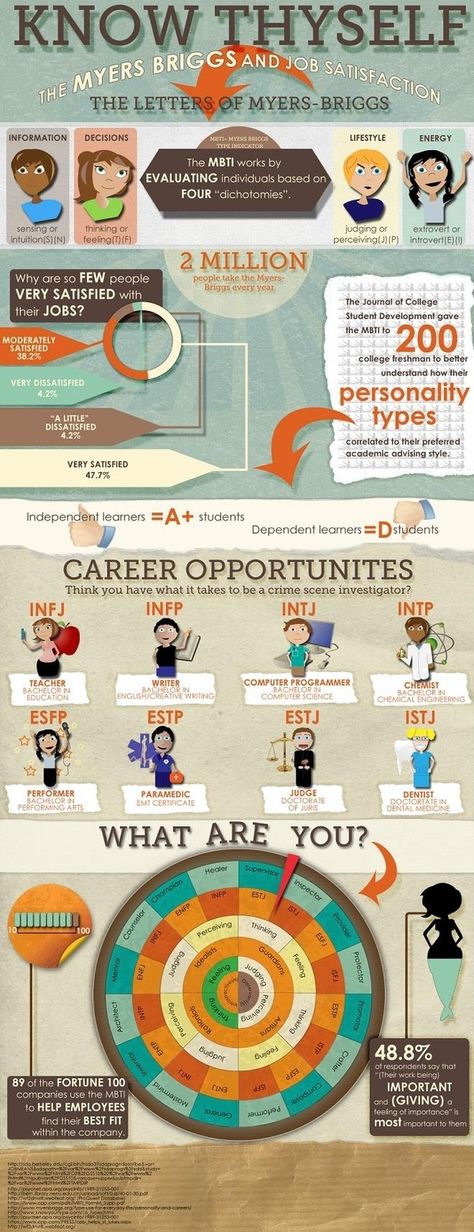 Some feelings are seen as “me,” while others are “not me.” By attempting to hold on to specific moods and express others, Fours believe that they are being true to themselves.
Some feelings are seen as “me,” while others are “not me.” By attempting to hold on to specific moods and express others, Fours believe that they are being true to themselves.
One of the biggest challenges Fours face is learning to let go of feelings from the past; they tend to nurse wounds and hold onto negative feelings about those who have hurt them. Indeed, Fours can become so attached to longing and disappointment that they are unable to recognize the many treasures in their lives.
Leigh is a working mother who has struggled with these difficult feelings for many years.
“I collapse when I am out in the world. I have had a trail of relationship disasters. I have hated my sister’s goodness—and hated goodness in general. I went years without joy in my life, just pretending to smile because real smiles would not come to me. I have had a constant longing for whatever I cannot have. My longings can never become fulfilled because I now realize that I am attached to ‘the longing’ and not to any specific end result.
”
There is a Sufi story that relates to this about an old dog that had been badly abused and was near starvation. One day, the dog found a bone, carried it to a safe spot, and started gnawing away. The dog was so hungry that it chewed on the bone for a long time and got every last bit of nourishment that it could out of it. After some time, a kind old man noticed the dog and its pathetic scrap and began quietly setting food out for it. But the poor hound was so attached to its bone that it refused to let go of it and soon starved to death.
Fours are in the same predicament. As long as they believe that there is something fundamentally wrong with them, they cannot allow themselves to experience or enjoy their many good qualities. To acknowledge their good qualities would be to lose their sense of identity (as a suffering victim) and to be without a relatively consistent personal identity (their Basic Fear). Fours grow by learning to see that much of their story is not true—or at least it is not true any more.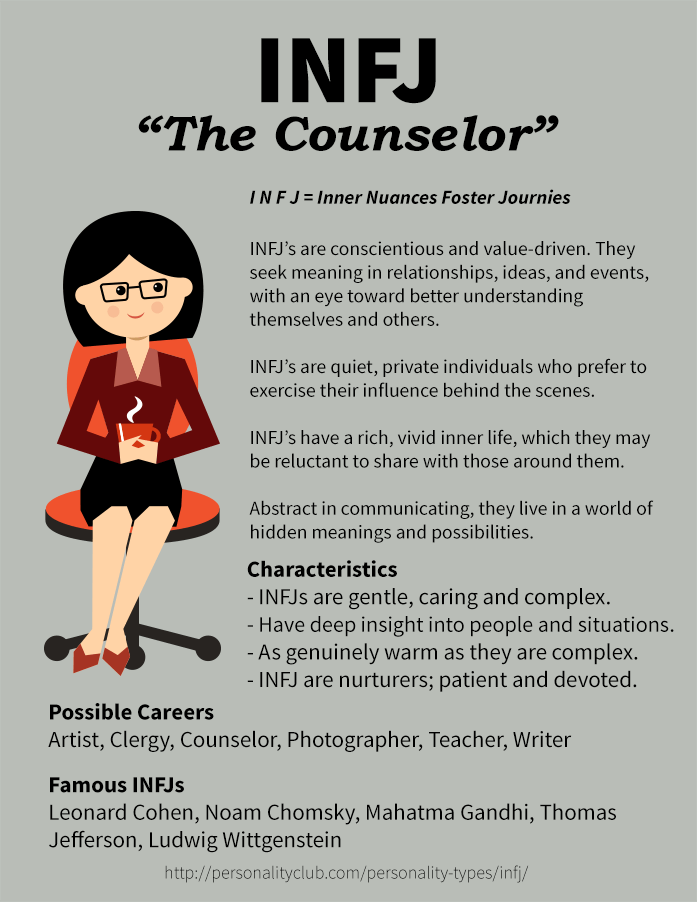 The old feelings begin to fall away once they stop telling themselves their old tale: it is irrelevant to who they are right now.
The old feelings begin to fall away once they stop telling themselves their old tale: it is irrelevant to who they are right now.
(from The Wisdom of the Enneagram, p. 180-182)
Listen: Don Riso Discusses Type Four
Type Four—Levels of Development
Healthy Levels
Level 1 (At Their Best): Profoundly creative, expressing the personal and the universal, possibly in a work of art. Inspired, self-renewing and regenerating: able to transform all their experiences into something valuable: self-creative.
Level 2: Self-aware, introspective, on the "search for self," aware of feelings and inner impulses. Sensitive and intuitive both to self and others: gentle, tactful, compassionate.
Level 3: Highly personal, individualistic, "true to self." Self-revealing, emotionally honest, humane. Ironic view of self and life: can be serious and funny, vulnerable and emotionally strong.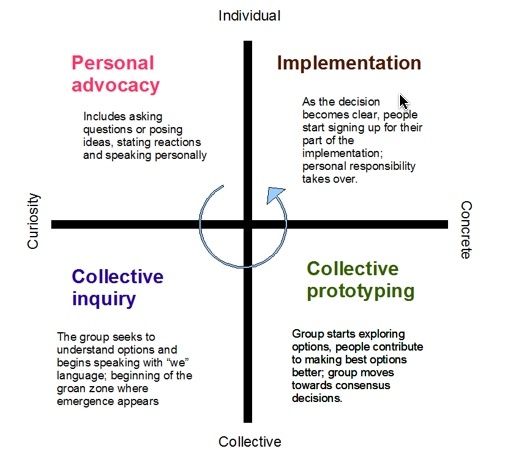
Average Levels
Level 4: Take an artistic, romantic orientation to life, creating a beautiful, aesthetic environment to cultivate and prolong personal feelings. Heighten reality through fantasy, passionate feelings, and the imagination.
Level 5: To stay in touch with feelings, they interiorize everything, taking everything personally, but become self-absorbed and introverted, moody and hypersensitive, shy and self-conscious, unable to be spontaneous or to "get out of themselves." Stay withdrawn to protect their self-image and to buy time to sort out feelings.
Level 6: Gradually think that they are different from others, and feel that they are exempt from living as everyone else does. They become melancholy dreamers, disdainful, decadent, and sensual, living in a fantasy world. Self-pity and envy of others leads to self-indulgence, and to becoming increasingly impractical, unproductive, effete, and precious.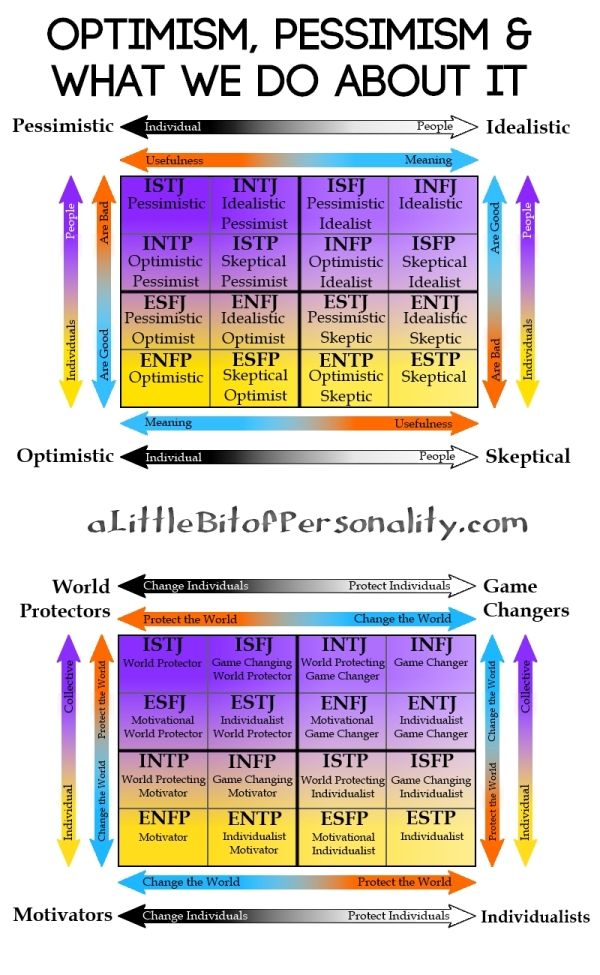
Unhealthy Levels
Level 7: When dreams fail, become self-inhibiting and angry at self, depressed and alienated from self and others, blocked and emotionally paralyzed. Ashamed of self, fatigued and unable to function.
Level 8: Tormented by delusional self-contempt, self-reproaches, self-hatred, and morbid thoughts: everything is a source of torment. Blaming others, they drive away anyone who tries to help them.
Level 9: Despairing, feel hopeless and become self-destructive, possibly abusing alcohol or drugs to escape. In the extreme: emotional breakdown or suicide is likely. Generally corresponds to the Avoidant, Depressive, and Narcissistic personality disorders.
Compatibility with Other Types
Type 4 in relationship with type:
1 2 3 4 5 6 7 8 9
Misidentification with Other Types
Type 4 compared with type:
1 2 3 5 6 7 8 9
Addictions
Over-indulgence in rich foods, sweets, alcohol to alter mood, to socialize, and for emotional consolation. Lack of physical activity. Bulimia. Depression. Tobacco, prescription drugs, or heroin for social anxiety. Cosmetic surgery to erase rejected features.
Lack of physical activity. Bulimia. Depression. Tobacco, prescription drugs, or heroin for social anxiety. Cosmetic surgery to erase rejected features.
Personal Growth Recommendations
for Enneagram Type Fours
- Do not pay so much attention to your feelings; they are not a true source of support for you, as you probably already know. Remember this advice: "From our present perspective, we can also see that one of the most important mistakes Fours make is to equate themselves with their feelings. The fallacy is that to understand themselves they must understand their feelings, particularly their negative ones, before acting. Fours do not see that the self is not the same as its feelings or that the presence of negative feelings does not preclude the presence of good in themselves" (Personality Types, p. 172). Always remember that your feelings are telling you something about yourself as you are at this particular moment, not necessarily more than that.
- Avoid putting off things until you are "in the right mood.
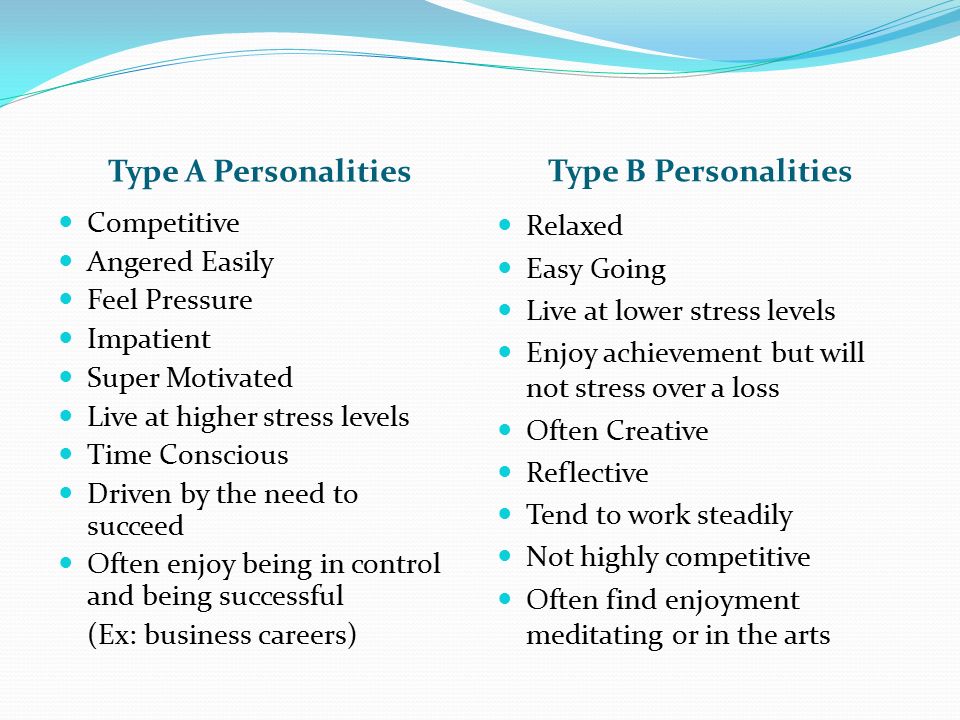 " Commit yourself to productive, meaningful work that will contribute to your good and that of others, no matter how small the contribution may be. Working consistently in the real world will create a context in which you can discover yourself and your talents. (Actually, you are happiest when you are working—that is, activating your potentials and realizing yourself. You will not "find yourself" in a vacuum or while waiting for inspiration to strike, so connect—and stay connected—with the real world.
" Commit yourself to productive, meaningful work that will contribute to your good and that of others, no matter how small the contribution may be. Working consistently in the real world will create a context in which you can discover yourself and your talents. (Actually, you are happiest when you are working—that is, activating your potentials and realizing yourself. You will not "find yourself" in a vacuum or while waiting for inspiration to strike, so connect—and stay connected—with the real world. - Self-esteem and self-confidence will develop only from having positive experiences, whether or not you believe that you are ready to have them. Therefore, put yourself in the way of good. You may never feel that you are ready to take on a challenge of some sort, that you always need more time. (Fours typically never feel that they are sufficiently "together," but they must nevertheless have the courage to stop putting off their lives.) Even if you start small, commit yourself to doing something that will bring out the best in you.

- A wholesome self-discipline takes many forms, from sleeping regular hours to working regularly to exercising regularly, and has a cumulative, strengthening effect. Since it comes from yourself, a healthy self-discipline is not contrary to your freedom or individuality. On the other hand, sensuality, excessive sexual experiences, alcohol, drugs, sleep, or fantasizing have a debilitating effect on you, as you already know. Therefore, practice healthy self-discipline and stay with it.
- Avoid lengthy conversations in your imagination, particularly if they are negative, resentful, or even excessively romantic. These conversations are essentially unreal and at best only rehearsals for action—although, as you know, you almost never say or do what you imagine you will. Instead of spending time imagining your life and relationships, begin to live them.
Learn More
The Riso-Hudson Books offer the most complete type descriptions available anywhere. Personality Types is the most complete, in-depth, systematic treatment of the nine types and the Enneagram system as a whole, and The Wisdom of the Enneagram provides the comprehensive guide to psychological and spiritual growth for the nine personality types.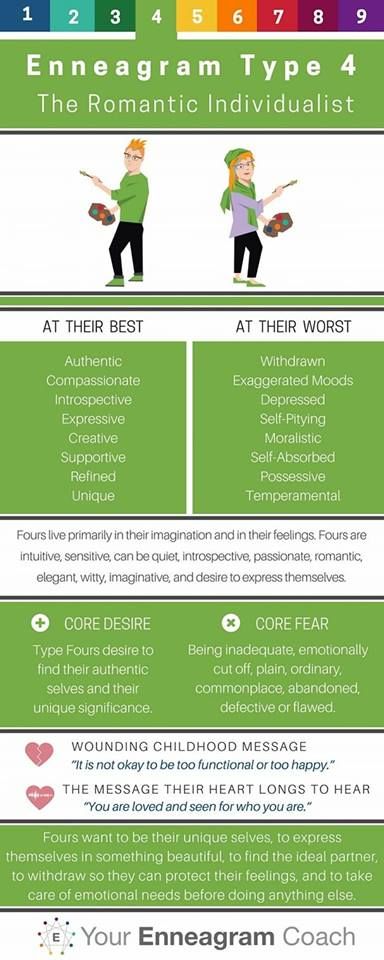
9 types of enneagram - how to better understand yourself | Swedbank
Growth Publication date: 11/01/2017
The word “enneagram” is of Greek origin: ennea means “nine” and gramma means “figure”. This is one of the oldest tools for studying personality, according to this tool, people are divided into nine types of personality. Each of them is dominated by one specific aspiration, fixation, or prism, formed in early childhood, through which a person looks at the world.
Each person is influenced by his environment - parents, school, society. These external influences become the "inner voice" that shapes the character and beliefs of the individual.
Obedience to this voice is perceived by a person as a certain survival strategy that helps to satisfy his basic needs - to be loved and to feel that you are accepted as you are. The image formed under the influence of this voice, which is a reflection of the personality in its self-perception, works like a shell: on the one hand, it protects, on the other, it limits, not allowing the full potential of the personality to be used.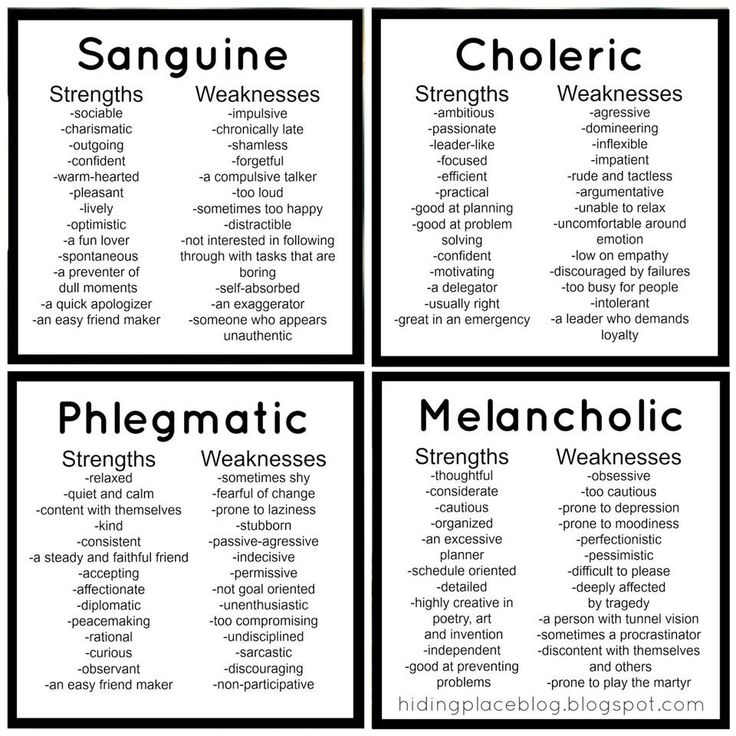 Knowing your personality type, a person better understands the deep motivation of his actions and what is necessary for his growth. Check out Ieva Salmane-Kulikovska, educator and personal growth consultant at the Spring Valley Development Center, for an explanation of the nine types of enneagrams for your growth!
Knowing your personality type, a person better understands the deep motivation of his actions and what is necessary for his growth. Check out Ieva Salmane-Kulikovska, educator and personal growth consultant at the Spring Valley Development Center, for an explanation of the nine types of enneagrams for your growth!
1. Perfectionist
Idealist with high internal standards and moral principles. Endowed with a high sense of responsibility, but sensitive to criticism. His life is defined by a deep-seated belief that the attention and recognition of other people can only be obtained by doing everything perfectly, so he tries to constantly improve himself. It is difficult for him to indulge in spontaneous pleasure and forget about his duties even for a moment. He also gets angry when others forget about them, but he does not openly show his irritation, and this undermines him as an internal dissatisfaction.
Growth Path
- Accept the shortcomings - your own and others - and understand that "almost good" is not always synonymous with "bad".
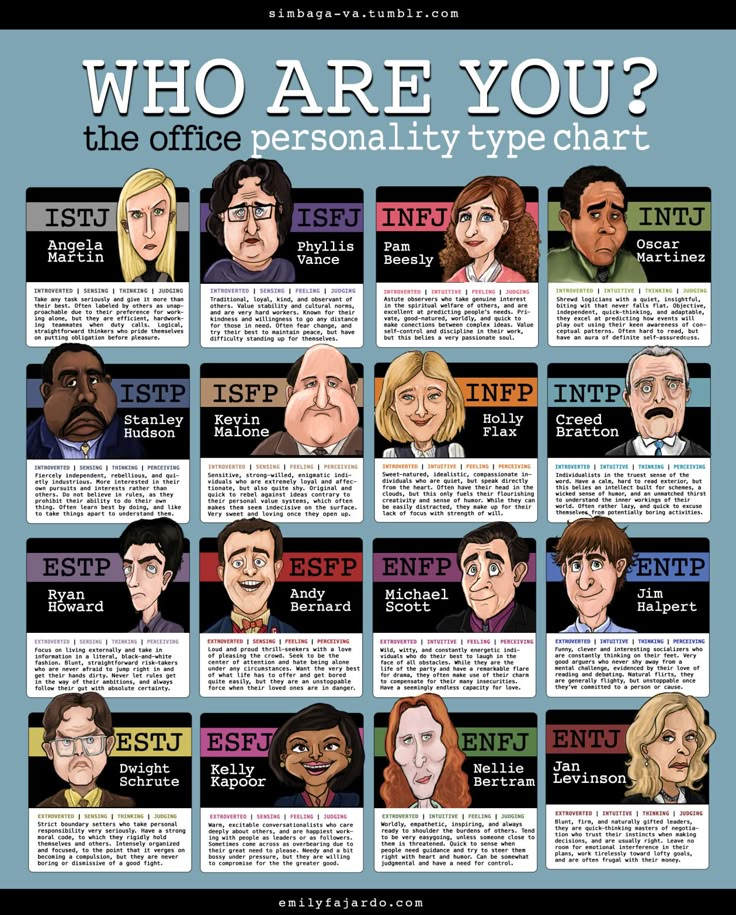
- Learn to understand your emotions, which leads to internal discussion of desires and needs.
- Set aside time for proper rest, indulge in pleasure and let spontaneity into your life - for example, by discovering the creative side of your personality.
2. Assistant
Soulful, sympathetic, always ready to help and generous. Most of all, he longs to be needed and to receive recognition, therefore he pays a lot of attention and care to others, often forgetting about himself. Incapable of refusing another person's request and feels uncomfortable when offered help is rejected. For an assistant, the appreciation of others is very important; if he doesn't get it, he feels underappreciated. It is difficult for him to accept help from others.
Growth Path
- Take time for yourself to identify your desires and needs and fulfill them.
- To learn to give without expecting gratitude in return, and to accept help from others, realizing that it brings them joy.
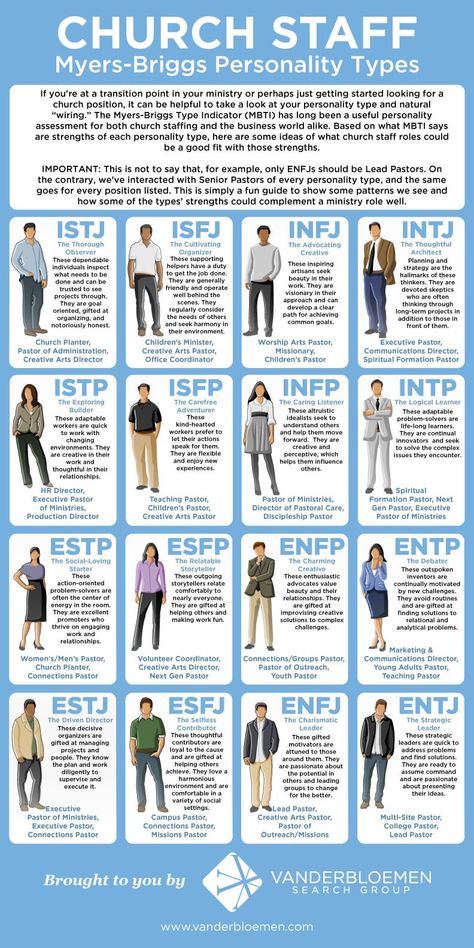
- Learn to say no.
3. Achiever
Very energetic, hardworking, self-confident and ambitious. He likes to be in the center of attention and easily adapts to situations, people and circumstances, showing his best side. The achiever is convinced that a person is what he does: in this world, everything is evaluated only by what has been achieved. Therefore, he focuses on the result, efficiency and success. For the achiever, his image in the eyes of others is very important, as well as the fact that others notice and appreciate his successes and achievements.
Growth Path
- Slow down and take time for yourself to listen to and understand your feelings.
- Assess what things in life are really important and what are not.
- To understand that a person's identity is not only what he has done and what others think of him, and that a person is loved not because of what he has done, but because of himself.
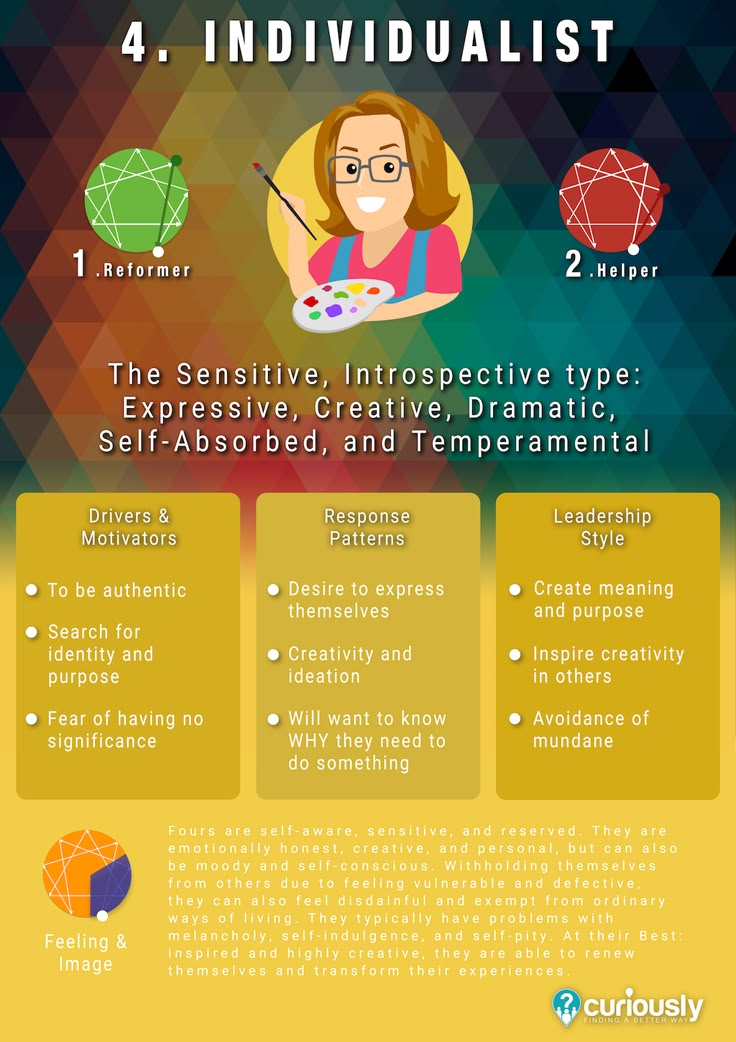
4. Individualist
Sensual, creative, self-oriented person with an intense perception of the world and a tendency to melancholy. The individualist concentrates on the aesthetic, authentic and different, and it is important for him to feel different from others. At the same time, it often seems to him that others have what he lacks, and this leads him to hidden envy and inconsolable longing, at the same time making him feel a little superfluous and misunderstood by others.
Path of growth
- Learn to see the beautiful and worthy of attention in the seemingly everyday and ordinary.
- Focus on what is, not on what is missing.
- To listen more to others, to their feelings and interests and to help others - this will help to avoid excessive immersion in oneself.
5. Observer
Rational, analyzing, observant and self-sufficient.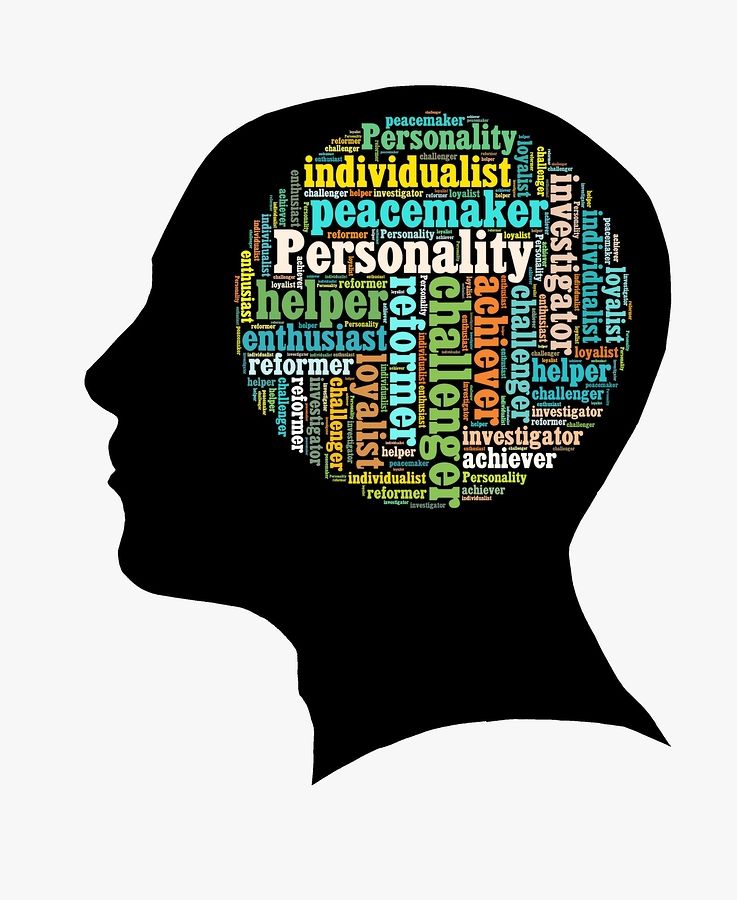 Usually does not show emotion. If the situation gets too heated, he seems to disconnect from his feelings in order to return to them later. The observer has a feeling that too close connections with others empty him and exhaust his resources, so he puts an invisible barrier around himself and prefers watching what is happening rather than active action. It is important for him to collect as much information as possible in order to understand what is happening.
Usually does not show emotion. If the situation gets too heated, he seems to disconnect from his feelings in order to return to them later. The observer has a feeling that too close connections with others empty him and exhaust his resources, so he puts an invisible barrier around himself and prefers watching what is happening rather than active action. It is important for him to collect as much information as possible in order to understand what is happening.
Growth path
- Allow yourself more self-expression, emotions, experiences, dare to talk about them.
- Recognize that retreating can provoke others to even more actively violate the boundaries of your territory.
- Communicate more actively with others and be more physically active, dare to experiment and indulge in life's pleasures.
6. Loyal Skeptic
Attentive, endowed with a great sense of duty. He is an excellent problem solver because he has a subtle ability to see many possible scenarios and risks. However, it happens that the skeptic hesitates, because he is always afraid of the worst outcome of the situation. Often he projects his thoughts and feelings onto others and sometimes does not distinguish objective reality from what is happening in his mind. He always checks others well before trusting them, but when he overcomes caution and gives himself completely to some business, he becomes very loyal to him. He is motivated by the desire to come to cooperation and reliability.
However, it happens that the skeptic hesitates, because he is always afraid of the worst outcome of the situation. Often he projects his thoughts and feelings onto others and sometimes does not distinguish objective reality from what is happening in his mind. He always checks others well before trusting them, but when he overcomes caution and gives himself completely to some business, he becomes very loyal to him. He is motivated by the desire to come to cooperation and reliability.
Growth Path
- Increase self-confidence and the ability to make decisions faster without getting stuck considering all the options.
- Learn to discuss your doubts and fears with others and accept that certain insecurities are a natural part of life.
- Engage in physical activity that helps to calm the rebellious mind - yoga, martial arts, etc.
7. Enthusiast
An optimist who is always looking for inspiring people, ideas and events.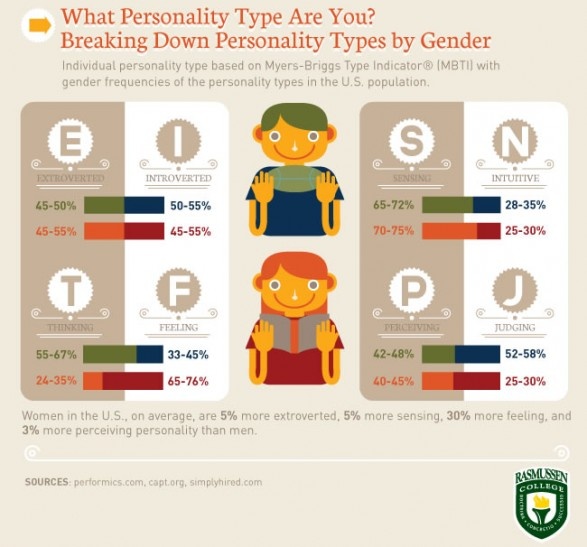 His mind is constantly occupied with new plans and possibilities. The desire to live dynamically and the desire for ever new experiences often lead to impatience and an inability to concentrate on one thing. The enthusiast does not want to limit his freedom in any way and face the dark sides of life. He seeks to avoid them by interpreting negative experiences as positive ones.
His mind is constantly occupied with new plans and possibilities. The desire to live dynamically and the desire for ever new experiences often lead to impatience and an inability to concentrate on one thing. The enthusiast does not want to limit his freedom in any way and face the dark sides of life. He seeks to avoid them by interpreting negative experiences as positive ones.
Growth Path
- Take more time for yourself.
- Realize that focusing only on the positive is an escape from reality.
- Learn to stop, limit yourself, concentrate on one job and finish what you started.
8. Boss
Honest, reliable, confident and strong. Wants to be in control at all times and despises weakness in others. He does not tolerate if someone, especially the weak, is offended, and is ready to protect him in everything. However, the boss's impulsive temperament and open displays of dissatisfaction can often lead to problems and cause others to perceive him as an aggressive person.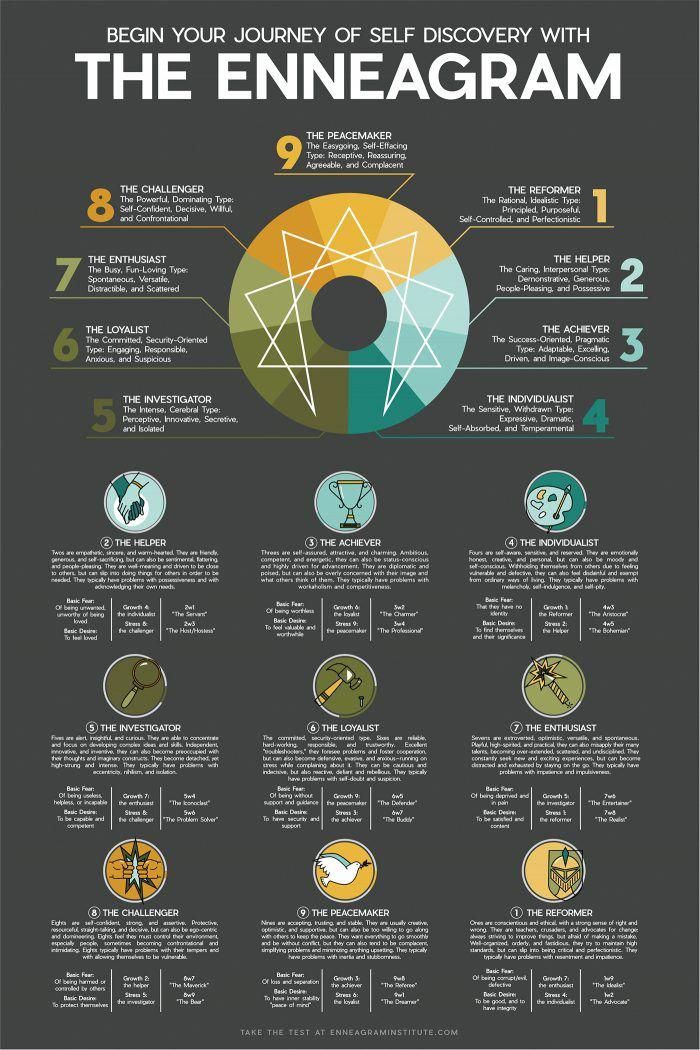 However, behind this facade lies another part of the personality - sensitive and fragile.
However, behind this facade lies another part of the personality - sensitive and fragile.
Growth path
- Learn to think about your actions first and then act, and not vice versa.
- Developing the ability to feel in the shoes of another person - this will promote empathy and reduce the desire to always dominate.
- Embrace your inner insecurity and find people to share it with.
9. Peacemaker
A balanced and calm person who tries her best to avoid conflicts and maintain balance and harmony in everything - in her life and in relationships with others. He knows how to easily find a common language with everyone and often takes on the role of conciliator. However, a peacemaker often subordinates his desires to the desires and needs of others, and it is difficult for him to clearly articulate and defend his opinion - especially if it differs from the opinions of others.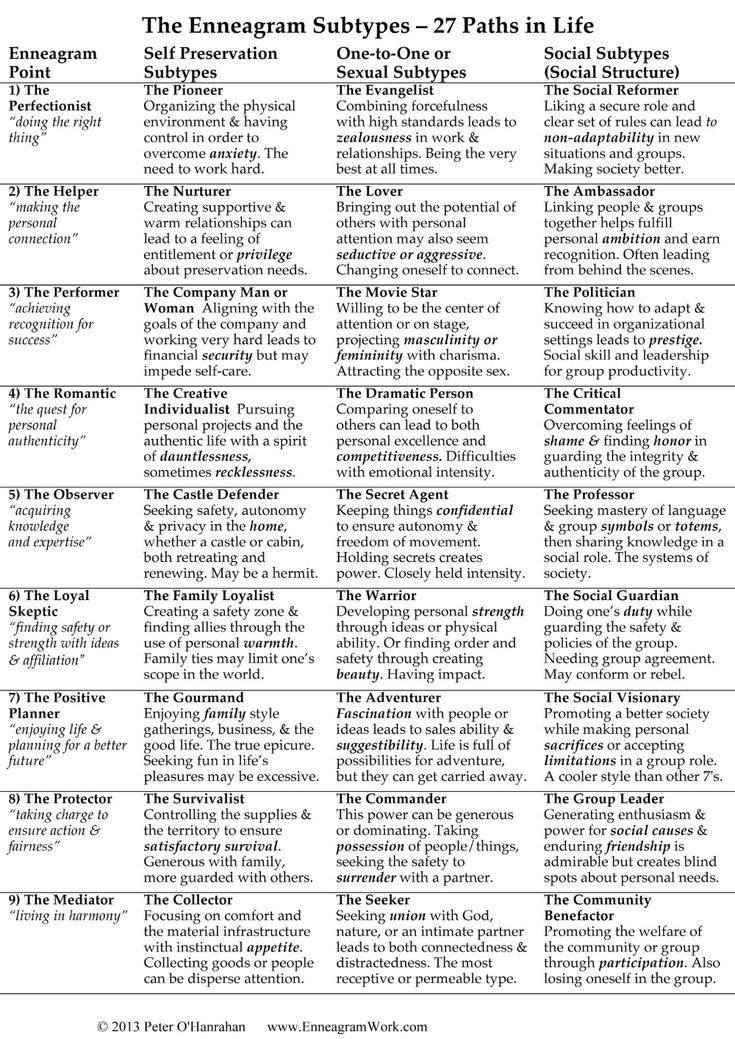
Growth Path
- Realize that your wants and needs are just as important as the wants and needs of others.
- Look into yourself and realize that your inner annoyance is a sign that for the sake of peace and tranquility you always subordinate your life to others.
- Become more decisive and specific, learn to formulate and express your opinion.
Type 4 - Individualist | Enneagram:
Fours in the Enneagram are called "Individualists". The name reflects their emphatically individual way of life and fixation primarily on themselves, and more specifically, on their feelings. People of the Fourth type are prone to dramatization, escalation of their feelings. This is because Fours have a deep belief "I exist as long as I feel."
Fours belong to the emotional center of the Enneagram, and, like all representatives of this center, they experience difficulties with acceptance from other people. In order to be accepted, Fours choose a strategy of detachment, "rebuilding", isolation.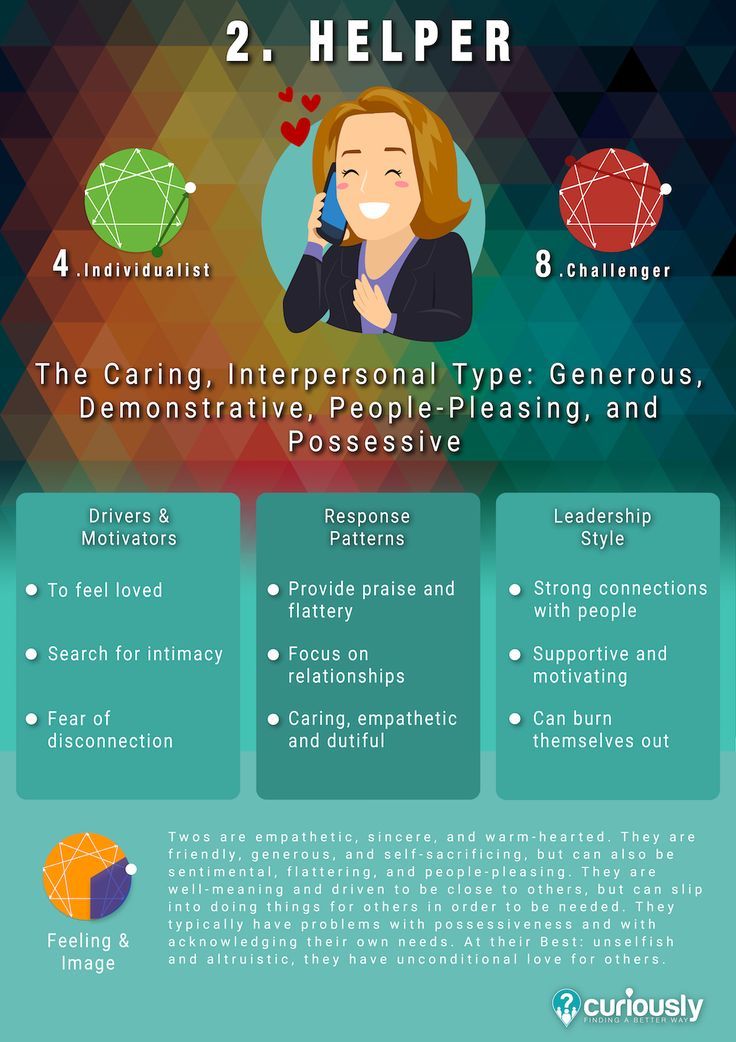 Such a strategy is aimed at attracting not all people, but those especially sensitive ones who will be able to discern a genuine diamond among the gray mass.
Such a strategy is aimed at attracting not all people, but those especially sensitive ones who will be able to discern a genuine diamond among the gray mass.
Fours are experts at creating close contact with other people. They are naturally prone to experiencing extremely powerful emotional states, with a wide amplitude, almost inaccessible to other types. Because of this, Fours often make excellent psychotherapists and other members of the helping professions.
Fours also have very strong access to creativity. It is important for them to express themselves and their emotional experiences, because their art is predominantly expressionism. There are a lot of actors, artists, musicians and writers among them.
Fours very often have an extravagant, sometimes even somewhat outrageous appearance. In their clothes, without fail, there will be a detail that emphasizes their individuality. They sigh often, intonations of their voices full of suffering, their message - help me.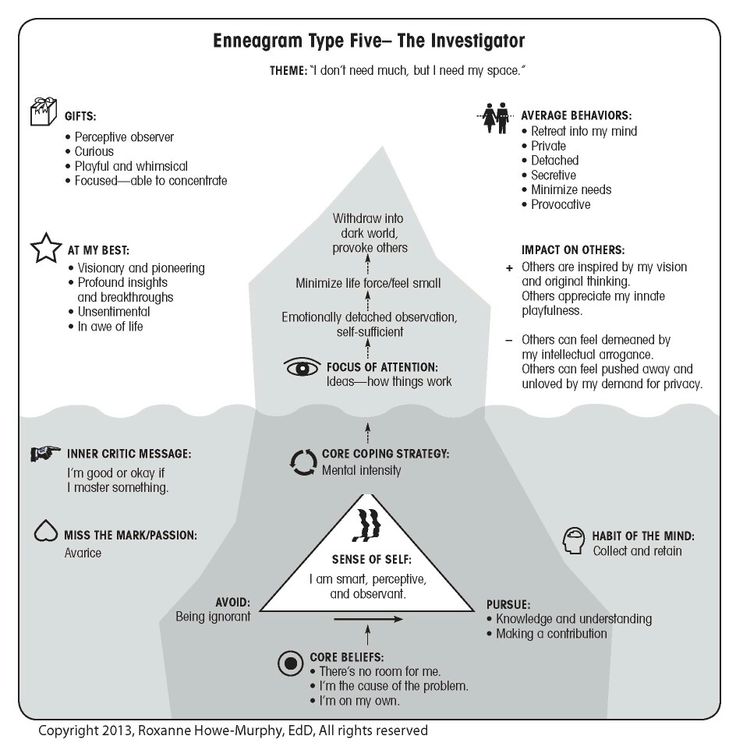 Their face is very expressive, their eyes are sad, and their gestures are poetic and soft. Often they act and look the opposite of the specific context, such as laughing at a funeral or being sad at a party.
Their face is very expressive, their eyes are sad, and their gestures are poetic and soft. Often they act and look the opposite of the specific context, such as laughing at a funeral or being sad at a party.
You may be Type 4 if you recognize the following:
- You have a tendency to yearn and crave what you feel is missing right now
- You have great taste and enjoy being extraordinary and special
- You often think about what others think of you and "read" their thoughts about you
- You strive for what is lacking through intense experience and creativity
- You deny ordinary life, ordinary life is boring for you
- You usually try to diversify everyday life and make it more exciting with the help of fantasies, creativity and dramatization of the imaginary
- You are deeply involved in emotional experiences and have the ability to support others in crisis situations
- You often have a desire to withdraw from social situations and you feel that you do not fit into the group
Motivation
Envy0238 .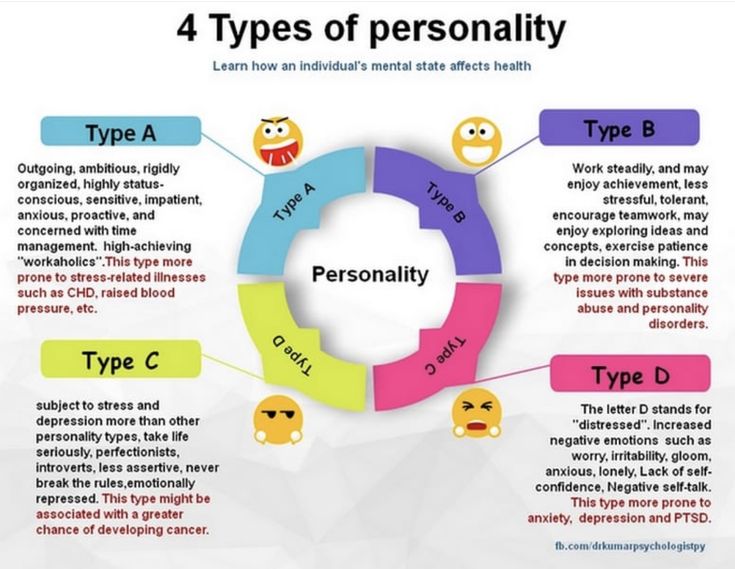 Fours identify with the part of themselves that doesn't match the ideal image, and that mismatch hurts them. Fours see themselves as worthless, flawed, flawed, twisted, and bizarre. They prefer to see other people as simple, somewhat gray, living an ordinary life and happy about it. This perception of self and others creates conflict. On the one hand, the Four tortures itself with reflections on the topic of its inferiority, because it cannot be like everyone else, accordingly, be accepted and admitted to “simple human happiness”. On the other hand, the suffering of Fours, the intensity of their experiences, their curvature, they believe, gives them the right to be arrogant towards other people, as if the fact that they experience subjective suffering makes everyone else indebted to them and guilty before them.
Fours identify with the part of themselves that doesn't match the ideal image, and that mismatch hurts them. Fours see themselves as worthless, flawed, flawed, twisted, and bizarre. They prefer to see other people as simple, somewhat gray, living an ordinary life and happy about it. This perception of self and others creates conflict. On the one hand, the Four tortures itself with reflections on the topic of its inferiority, because it cannot be like everyone else, accordingly, be accepted and admitted to “simple human happiness”. On the other hand, the suffering of Fours, the intensity of their experiences, their curvature, they believe, gives them the right to be arrogant towards other people, as if the fact that they experience subjective suffering makes everyone else indebted to them and guilty before them.
Envy in the psychoanalytical sense is the desire to stain, destroy and corrupt a beneficent source. According to the theory of the famous psychoanalyst M. Klein, the child bit the mother's breast, for which he was rejected. If we consider this psychoanalytic somersault as a metaphor, then the dynamics of the attitude of adult representatives of the type becomes clear. They try to attract people into their lives who will take care of them and love them, but once they find it, they suck out this person.
If we consider this psychoanalytic somersault as a metaphor, then the dynamics of the attitude of adult representatives of the type becomes clear. They try to attract people into their lives who will take care of them and love them, but once they find it, they suck out this person.
For them, what is accessible and available will never be as attractive as what is not available. Having received something that was previously inaccessible, they will devalue it, considering it unworthy and gray.
Envy is associated with suffering, Fours bathe and enjoy suffering, it becomes meaningful for them.
Fixation Fours is called longing , or false insufficiency . People of the Fourth type realize in childhood that they receive care when they are sick or when they get into trouble.
Another aspect of the character of the representatives of the Fourth type is masochism. Masochism is a way and form of establishing a connection with another person, as well as a way of overcoming difficulties through self-abasement.